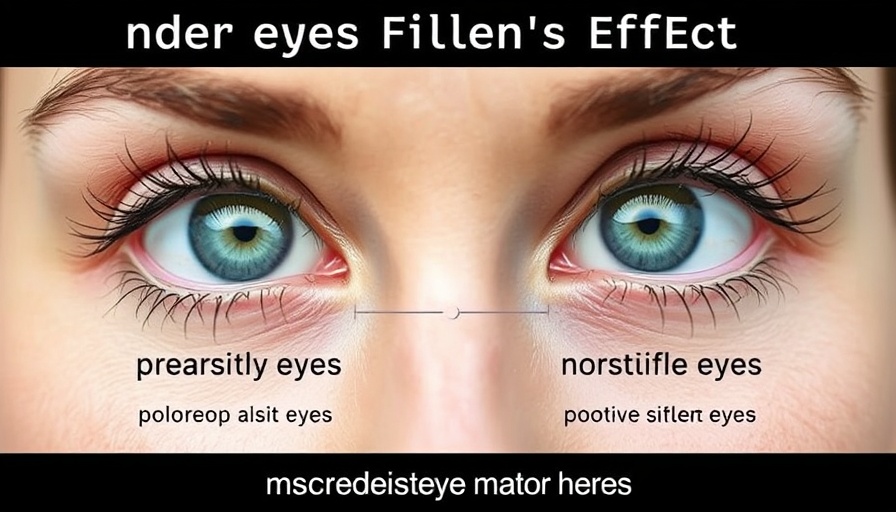
Understanding Under-Eye Fillers: What You Need to Know
Have you ever wondered why people opt for under-eye fillers, also known as tear trough fillers? These injectables are designed to combat the hollowing and dark circles that can make us appear tired or upset, even when we're feeling vibrant and full of life. As we age, the skin under our eyes can lose volume, leading to pronounced shadows and puffiness. But before jumping into the chair for treatment, it’s crucial to grasp whether you truly need it. This analysis draws insights from skin expert Dr. Mary Osmina, based on her conversation with Dr. Rebecca Kaisen, a board-certified dermatologist.
In 'What You Need to Know Before Getting Under-Eye Fillers!', the discussion dives into the essential considerations and misconceptions regarding this popular cosmetic treatment, exploring key insights that sparked deeper analysis on our end.
Why Do People Seek Under-Eye Fillers?
People often seek under-eye fillers to restore a youthful appearance. This area, also called the tear trough, becomes more prominent with age as the fat and skin can become lax. This sagging can exaggerate hollow areas, contributing to a fatigued look. Dr. Kaisen asserts, “Not all dark circles or bags under the eyes need filler.” Sometimes, the issue might stem from vascular problems or pigmentation that fillers cannot fix. This takeaway underscores how important a thorough consultation and assessment are before assuming that fillers are the answer.
Knowing If You're a Good Candidate for Fillers
It's essential to establish whether you are a suitable candidate for tear trough fillers. Dr. Kaisen advises potential patients to expect a meticulous examination that identifies true volume loss rather than superficial undereye issues. For instance, if the dark circles aredue to blood vessels or skin pigmentation, fillers may not be appropriate. A qualified dermatologist will consider your unique anatomy and any potential complications before proceeding with treatment.
The Risk of Over-Filling: Aesthetic Implications
One of the most significant risks associated with under-eye fillers is over-filling, which can result in an unnatural appearance. Patients should be cautious of achieving a perfectly smooth transition from the eyelid to the cheek that negates natural anatomy. Dr. Kaisen shared horror stories of over-injection, noting that achieving a child's youthful look involves some degree of indentation between the eyelid and cheek. It’s a fine balance that requires skilled hands—an artist’s precision—rather than a heavy-handed approach.
Techniques for a Natural Appearance
For optimal results, practitioners should adopt a technique called "low and slow." Instead of pushing a full syringe into the tear trough at once, Dr. Kaisen recommends starting with smaller amounts and assessing how it settles in. This progressive approach allows for a more natural look, as too much filler can not only risk bumpiness but may also create undesirable effects like a bluish hue, giving away the fact that someone has had work done.
Understanding Bruising and Recovery
Another common concern patients have—especially before an event—is bruising following the injection. Given that the under-eye area is rich in blood vessels, some patients may experience temporary bruising, which is generally not a complication but a reality of the injecting process. Experts recommend minimalizing blood thinners pre-treatment and taking care of the area in the days that follow to help reduce bruising. The process is described as relatively quick, with immediate results, but patients are advised that the full effect becomes more apparent over a week as the filler settles.
Alternative Treatments Worth Considering
While under-eye fillers may be a popular choice, they aren’t the only option available for rejuvenating the area. Alternatives such as laser resurfacing or microneedling can also effectively improve skin texture and reduce dark circles caused by pigmentation. Experts advocate a combined approach, assessing all available treatments, including more invasive procedures like lower blepharoplasty for patients with significant eyelid puffiness.
The Issue of Migration: Clearing Misconceptions
Migration and the longevity of fillers are often buzzworthy topics on social media. Many individuals harbor fears that once injected, fillers will permanently settle in unintended areas or become harmful. It's essential to alleviate these concerns. As Dr. Kaisen explained, while hyaluronic acid fillers can last longer than expected (but not permanently), they can be dissolved if necessary. Knowing this can provide peace of mind to those contemplating the treatment.
Final Thoughts on Under-Eye Fillers
In conclusion, under-eye fillers can be a game-changer for individuals struggling with true volume loss in the area between the eyelid skin and the cheek. However, it’s vital to seek treatment from a skilled cosmetic dermatologist who understands the nuances of facial anatomy and can advocate for the best personalized approach.
Interested in rejuvenating your look? Take the time to consult with a qualified specialist to explore whether under-eye fillers may be the right solution for you. And remember, your best results come from informed choices.
 Add Row
Add Row  Add
Add 




Write A Comment